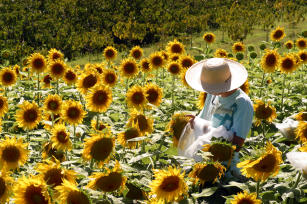Development and Modeling of Oil Seed Production Systems During Sugarcane Crop Reforming Periods
Development and Modeling of Oil Seed Production Systems During Sugarcane Crop Reforming Periods

Photo: LANZETTA, Paulo
The recent expansion of sugarcane's culture by the mid-southern states of Brazil (Paraná, São Paulo, Mato Grosso do Sul, Minas Gerais - except the north, and Goiás), has been mostly happening on areas where degraded grasslands occur, characterized by eroded soils which are poor in nutrients, under distinct hydric regimes in regions of traditional sugarcane production. The incorporation of these flat topography areas enables mechanized harvesting and a more intensive soil use, with the elimination of straw-burning practices, a condition predicted in sugarcane agro-ecological zoning. This represents an opportunity to incorporate other species during crop reforming periods, specially on oil seed cultures for the production of biodiesel. However, in order to incorporate these new species in the sugarcane production system, it is necessary to promote the adjustments which involve sugarcane and alternative cultures of soy, peanuts or sunflower. These adjustments involve characterizing and validating oil seed cultivation systems, especially the development of fertilization recommendation systems. In order to allow the manager of a sugarcane production system to make decisions regarding the implantation of a sugarcane production system that involves the use of oil seed cultures during the crop reforming period, it is necessary to have in hands a series of information. It is necessary to know under what conditions a reform area is viable, energetic, environmentally and economically, for the implantation of rotation systems with oil seeds; what are the culture options to implant the rotation, and what are the respective technical and agronomical recommendations(soil fertilizing in rotation systems); what is the energetic balance or the rotation system; how the system should be managed (outsourcing or auto-production); among others. In order to answer these questions, the present project evaluates, technically, economically, and environmentally, a new sugarcane production system, without fires and with the use of oil seeds (soy, peanut or sunflower seeds), with the use of different mathematical systems in order to analyze what are the necessary nutrients to the culture's development and the interaction amongst them, of the energy produced by the system, and of the greenhouse gases emissions.
Status: Completed Start date: Wed Sep 01 00:00:00 GMT-03:00 2010 Conclusion date: Thu Oct 31 00:00:00 GMT-03:00 2013
Head Unit: Embrapa Digital Agriculture
Project leader: Fabio Cesar da Silva
Contact: fabio.silva@embrapa.br
Keywords: agroenergia, diagnóstico, modelagem, oleaginosas, rotação de cultura, sistema de produção
